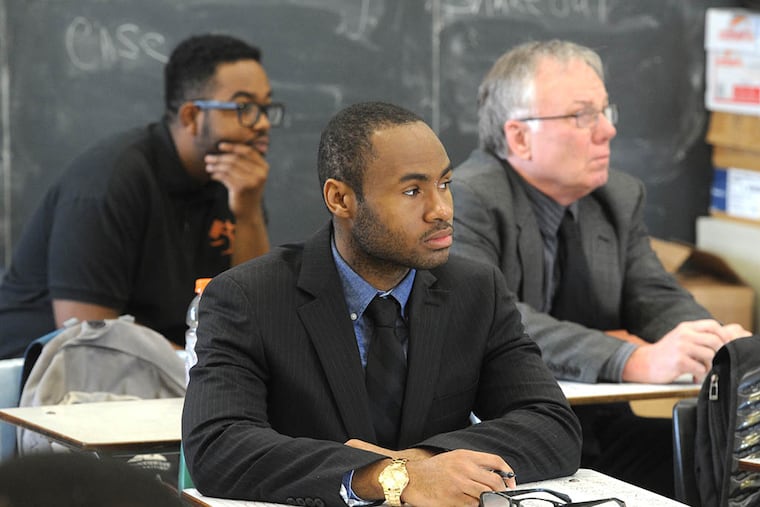At Chester High, peers do each other justice
Jamar Saunders had a D average and was in a Chester gang. Brian Foster had a quick temper and was prone to settle disputes with his fists.

Jamar Saunders had a D average and was in a Chester gang. Brian Foster had a quick temper and was prone to settle disputes with his fists.
That was six years ago, before a session in court changed all that. In their cases, it was the Chester High School Youth Court.
They say it gave them second chances, introduced them to mentors, and improved their communication skills.
Now those erstwhile self-described "troublemakers," the two Chester residents are back in court. This time, however, it is as Chester High Youth Court advisers. And their involvement has cemented their friendship.
They hope to make a difference in the lives of current students, some of whom are from troubled families in a city where a third of the households live below the poverty level.
Youth courts - in which trial-like proceedings are held in classroom settings, and students serve as attorneys, judges, and jurors - have become popular locally and across the country, and there are plans to create at least 10 more in the region.
"Youth Court definitely kept us together," said Foster, who is working on a film degree, works part-time with Youth Court, and was best man at Saunders' recent wedding.
"It's a positive influence," said Saunders, who served as a Marine and is a personal trainer.
Youth courts - often referred to as peer-to-peer, teen, or student courts - are part class work, part club, and part tribunal.
The Chester Upland School District has five courts in three schools and plans to expand to every school. In all, more than 1,000 courts are operating in the country, according to the National Association of Youth Courts, including those in Philadelphia, Pottstown, and West Chester.
"If we have robust youth courts in schools, we will greatly reduce that school-to-prison pipeline," said Gregg Volz, the director of the Youth Court Support Center at EducationWorks, a Philadelphia nonprofit that provides programs for poorer communities.
Nationally, about two-thirds of the courts tie into the local juvenile justice system, he said.
Volz has trained 40 groups to conduct youth courts in Philadelphia, Camden, Norristown, Chester, and Wilmington.
He said the courts help students avoid suspensions, hold them accountable for their actions, and expose them to the law and criminal-justice systems in a positive manner.
Law professors and students from six area law schools, as well as volunteers in the fields of law and social work, and assistant U.S. attorneys from the Philadelphia office, devote time to train students for youth court.
"It is such a cool idea when kids take care of kids," said Volz.
In Chester, the students handle minor offenses such as disrupting class, defiance, truancy, or conflicts with others for the 1,096 students. The consequences can include apologies, essays, and referrals for tutoring.
"Youth Court teaches us about responsibility," said Nashia Clark, 16, a junior and current member of the court. "It also teaches us to think twice before taking action."
The Chester court is part of a class called Street Law, said Donna Scott-Brown, the teacher. The classroom has a judge's bench, a jury box, and a table for the advocate and student respondent, who must admit guilt to participate.
At a recent hearing, the student respondent - or defendant - sat ramrod straight and nervously tapped his fingers on the desk as the charge against him was read to the jury: Talking in class while others were working.
"Put yourself in his shoes. We all do the same thing," said Shamour Young, 17, the student's advocate in court. The student, a first-time offender, was sorry, he said.
After Young finished his pitch for leniency, it was time for the jurors to fire questions.
"Why were you talking?"
"I was catching up with my friends."
"Will this occur again?"
"No."
"Why should we believe you?"
"I usually don't let people down."
The student had to deliver an apology to the teacher by the end of the day. Because he was honest and had not been in trouble before, there would be no further action.
When the proceeding was over those students not chosen for the jury critiqued the case. That is where Saunders and Foster came in. They gave feedback to participants and encouragement to those who want to take a bigger role.
"It's trying to create a space of open minds and critical thinkers," said Foster.